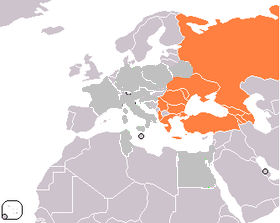Organization of the Black Sea Economic Cooperation
 |
|
| Name: Organization of the Black Sea Economic Cooperation | |
| Acronym: BSEC | |
| Year of foundation: 1992 | |
Headquarters: Istanbul, Turkey | |
BSEC documents: go to page | |
BSEC official web site: go to page | |
FOCUS ON | |
| Bsec Parliamentary Assembly (PABSEC) |
Description
The Organisation of Black Sea Economic Co-operation (BSEC) is an inter-governmental organisation created with the aim to establish an area of prosperity and security in the European periphery.
Member states
BSEC has 12 member states, namely:
![]()
![]()


![]()
![]()
![]()

![]()
![]()
![]()
![]()
History
In the mid to late eighties, the countries surrounding the Black Sea - Albania, Armenia, Azerbaijan, Bulgaria, Georgia, Greece, Moldova, Romania, the Russian Federation, Turkey, Ukraine and Serbia - aware of being bound by geographic proximity as well as a common cultural and historical heritage and in light of the ongoing changes brought on by the decline in bipolar competition and the deepening of European integration, upon Turkey’s initiative, decided to start a regular dialogue leading them to launch the Black Sea Economic Co-operation (BSEC) in 1992 in Istanbul. Through the founding Charter adopted at the summit in Yalta in 1998 and entered into force in May of the following year, the BSEC achieved an international legal identity enabling it to effectively become a regional economic organisation.
The BSEC has undoubtedly succeeded in creating a framework for multilateral co-operation in an area with different geopolitical and economic realities and hence affected by great turmoil. In a region representing not only an area rich in oil and gas, but also a strategic corridor for the passage of raw materials between Asia and Europe, the organisation has especially committed itself to ensuring political stability and promoting the growth of trade. To this end, priority has been given to sectors such as energy, transport and telecommunications. However, acting according to perspectives of sustainable development, special attention has also been given to issues concerning environmental protection and especially the marine ecosystem. The presence within the organisation of EU Member States and candidates has contributed to turning the objectives of good governance, democracy and protection of human rights into topics for debate and exchange of opinions improving the regional political climate. From drug trafficking to illegal immigration, from the proliferation of weapons and radioactive material to terrorism, a number of factors have made the BSEC the focal point of a broad system of interdependencies. Moreover, bringing together Muslim and Christian countries in a structure of multilateral co-operation, the Black Sea organisation also plays an important role in responding to the resurgence of a spiral of fanaticism after September 11th. Accordingly, this intergovernmental forum has aimed at increasing internal intercultural dialogue initiatives to improve mutual understanding and avoid risks of religious exploitation. The BSEC has undoubtedly gained significant influence in the stabilisation process of its European neighbours. Therefore, the deepening of its ties with Brussels is strategic to the strengthening of its role and of making it more functional to the Community strategy, aimed at promoting democracy and economic development in the region.
BSEC structure and decision-making procedures
Council of the Ministers for Foreign Affairs
The Council of the Ministers for Foreign Affairs is the BSEC central decision-making organ. It meets every six months to define every aspect pertaining to the functioning of the organisation.
The Parliamentary Assembly
The Parliamentary Assembly (PABSEC) established in 1993 and following the model of the Parliamentary Assembly of the Council of Europe, includes a Standing Committee, a Bureau, three specialised Committees (on economic, trade, technological, environmental affairs; political and legal affairs; social and cultural affairs) and an International Secretariat. It meets twice a year with national parliamentarians and provides, despite having only a consultative role, a consistent support to the Council, formulating opinions and recommendations by absolute majority.
Permanent International Secretariat
The Permanent International Secretariat, based in Istanbul, is headed by a Secretary General. Its aim is to provide administrative support to the decision-making structures of the organisation.
Business Council
The Business Council consists of experts and representatives of Chambers of Commerce of the Member States and promotes co-operation between public and private sectors.
Trade and Development Bank (BSTDB)
The Trade and Development Bank (BSTDB) administers funding for regional co-operation projects. The Bank funds projects also thanks to the support of the European Investment Bank (EIB) and the European Bank for Reconstruction and Development (EBRD).

